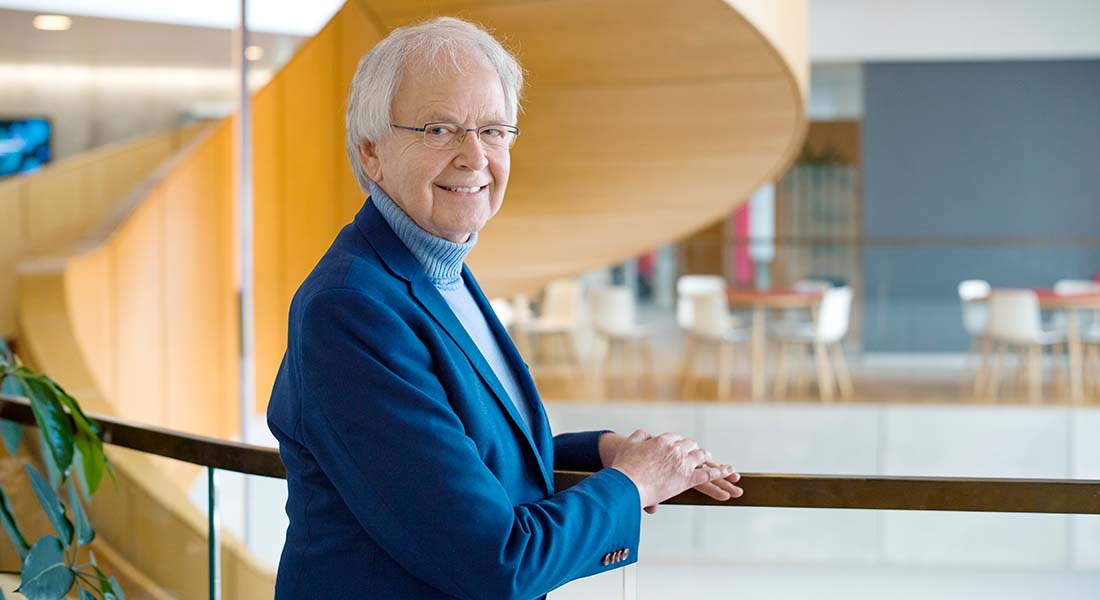A pioneering microbiome researcher embarks on his swansong to explore his “most exciting scientific breakthrough ever"
Professor Oluf Borbye Pedersen was already an accomplished and internationally recognized researcher in 2010 when he helped establish the Novo Nordisk Foundation Center for Basic Metabolic Research (CBMR) at the University of Copenhagen. Now, after more than a decade of research on human genomics and the microbiome in the Maersk Tower, he continues his research at Gentofte University Hospital to explore the potential therapeutic benefits of a bacterial hormone that his team discovered in 2019, and which was patented by the university in 2021.

After publishing more than 1000 peer-reviewed scientific articles over five decades – including several dozens in high impact journals Nature and its sister journals, Science, the Lancet and the New England Journal of Medicine – Professor Oluf Borbye Pedersen’s research is still going strong. His focus is DNA-based studies of the vast number of health-promoting microbes living with us, the microbiome. Especially, he explores the causality mechanisms of certain microbes in regulating metabolic health. He now takes the next step in his accomplished career to explore the promise of a novel hormone of bacterial origin.
“It is one of the most exciting breakthroughs in my 50 years as a scientist,” says Oluf Borbye Pedersen from the Novo Nordisk Foundation Center for Basic Metabolic Research (CBMR) at the University of Copenhagen.
From basic research to a patented discovery of the first-in-class bacterial hormone
Together with Professor Juleen R. Zierath and Professor Thue Schwartz, Oluf Borbye Pedersen wrote the successful application to the Novo Nordisk Foundation to establish CBMR in 2009, and from 2010 and until 2016 he served as Director of the Section for Metabolic Genetic. Since 2016, he has been a Group Leader at CBMR whose team has focused on the genetics of cardiometabolic disorders, while pioneering international research in the gut and oral microbiome in relation to human health.
It was here that he discovered the hormone together with his team members Postdoc Yong Fan and PhD Student Liwei Lyu in 2019. In June 2021, the University of Copenhagen filed a patent due to its promise in the prevention and treatment of obesity, type 2 diabetes and osteoporosis. Oluf Pedersen and his team of basic and clinical scientists have since been granted 17 million Danish kroner from the Independent Research Fund Denmark and the Novo Nordisk Foundation to continue their research.
While he formally leaves his position as Group Leader at CBMR at end of December, he will remain affiliated and continue to supervise three young investigators at CBMR and their basic and epidemiological research of the gut microbiome.
Embarking on his “swansong”
At Gentofte University Hospital, Oluf Borbye Pedersen assumes the position of Research Chief Physician, while he also takes on a new Professorship of Human Metabolism at the Department of Clinical Medicine, in the Faculty of Health and Medical Sciences, at the University of Copenhagen. It is the sixth professorship of his career, which has been recognized by many distinguished awards, including Order of the Dannebrog, Knight 1st Class, the Claude Bernard Award from the European Association for the Study of Diabetes (EASD), the Hagedorn Award, and the 2020 Novo Nordisk Foundation Lecture Prize.
The scientific voyage does not stop here and Oluf Borbye Pedersen is far from done. While the hormone has been patented, much more work needs to be done to realise its full clinical potential. And he hasn’t been as excited since his 2008 discovery of a paradigm-shifting intensified multifactorial treatment for type 2 diabetes – the Steno-2 –trial - that showed a gain of life with 7.8 years. Study outcomes that have transformed diabetes treatment worldwide.
“I consider this discovery my scientific swansong – the culmination of five decades of dedicated and exciting research. I couldn’t be more excited to see where it takes us.”
